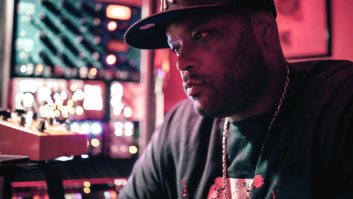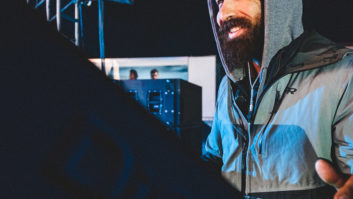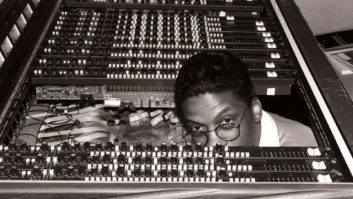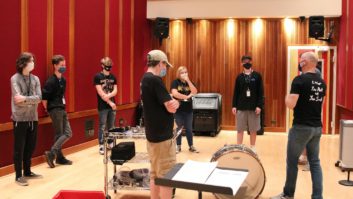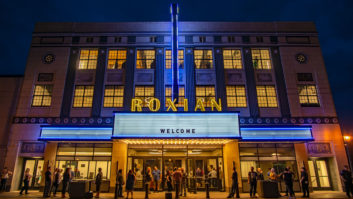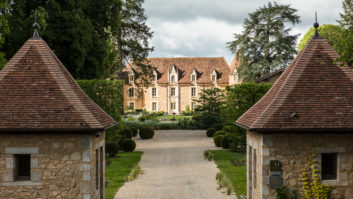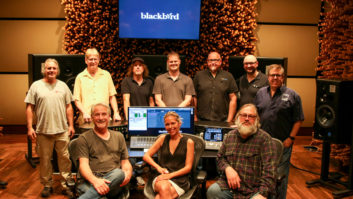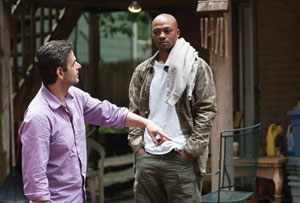
Christos Tsantilis and Ka
Merlin’s Kitchen
By Matt Gallagher
Producer/engineer/studio designer Christos Tsantilis mixed and mastered the third album from veteran Brownsville, Brooklyn–based rapper/producer Ka, The Night’s Gambit (Iron Works), which received critical acclaim upon its summer release. Ka self-produced and self-released this effort, featuring his stark beats and intensely hushed, sometimes understated delivery of deeply reflective and evocative lyrics. Tsantilis and Ka worked together in Merlin’s Kitchen, Tsantilis’ studio on Staten Island.
“It’s a well-balanced room, very cozy and well-tuned, fitted with PMC monitors and mini computer speakers,” Tsantilis says. “The first track on the album set the vision, so we focused on that until we both felt we had clinched it. The rest just flowed after that. All sessions were in Pro Tools. I prepped tracks with basic EQ via Sonnox plug-ins and NTI Nightpro and API outboard. [I applied] slight compression with TK Audio and Manley Variable Mu Stereo compressors, among a few other comps, as well. Delays and reverbs were all added in as the mix came to gel.”

Justin Guip
Woodstock Gives Musicians a Few Homes in the Country
By Barbara Schultz
Last January, Mix covered Graham Parker and The Rumour’s reunion-album sessions at Dreamland Recording, a converted church in West Hurley. It’s just one of the great spaces New York musicians can call home-away-from-home in and around Woodstock.
Levon Helm Studios, for example, continues to be an inspiring destination for roots musicians such as Steep Canyon Rangers or the David Bromberg Band; both recently made new albums there with chief engineer Justin Guip.
“It’s a modular setup,” Guip says of the facility he helped the late great artist assemble. “We have a lot of great vintage and new outboard gear. I’m running a Pro Tools 10 HDX system with Apogee AD/DAs, a beautiful vintage Neve sidecar, outboard compressors, and a great microphone collection.” The studio is one open space—no separate control room—which Guip feels improves communication and vibe.
Applehead Recording (appleheadrecording.com) is another rural retreat, on a farm in Saugerties. The studio recently hosted the indie band Lucius for a week of sessions, recorded by engineer and bandmember Dan Molad. “We wanted a place that had a Neve console, and where we could sleep and be isolated for a stretch of time,” Molad says. “Applehead is a beautiful, open-sounding space; the live room has vaulted ceilings. It’s green everywhere outside. It was the combination of an inspiring space and gear that we wanted.”
Lucius’ sound is synth-heavy but defined by the lush, sensitive vocal harmonies of Jess Wolfe and Holly Laessig. Molad auditioned several mics in Applehead’s collection before settling on a Telefunken AK-47 for Wolfe and a Sony C-37A on Laessig, each going through pre’s in the Neve 3503 with Purple MC77 compression; the lead singers always cut vocals facing each other in the same room. “For a lot of songs,” Molad says, “we sent their vocals through an aux to a tape echo and sent that to an amplifier in the room, so I was able to make the room feel even bigger.”

Capsula: Power Trio Gets Boost from Tony Visconti
By Blair Jackson
Though the hard-rocking trio Capsula—originally from Argentina, now based in Spain—have been around for years, they’re getting a lot of attention now because their latest opus, Solar Secrets, was co-produced by Tony Visconti, of Bowie and T. Rex fame. And it’s a revelation—a dark, deft blend of psych-punk energy, exciting guitar pyrotechnics (courtesy of leader and co-producer Martin Guevara) and enough hooks to make it memorable. The disc was cut mostly live in the studio—with vocals and plenty of guitar layers added later—by Visconti and engineer Tim Price at (since closed) St. Claire Studios in Lexington, Ky., on an SSL 9000J. Joining Guevara in the band is bassist/co-songwriter Duchess Duchess and power-drummer Ignacio Solimo.
“Martin is fantastic at getting crazy guitar sounds,” Price says. “He loves reverbs and used all amp reverb; he really knows how to work his amps and pedals. I used a [Shure] 57 and a [Royer] 121 on him, just trying to capture what came out of the amp.” How about the trippy backwards guitar on “Birds of Wood”? “Oh, that was Tony’s idea, of course.”
“I was heavy-handed on the compression during tracking,” Price continues. “I really wanted to make sure Tony had good sounds and the best possible options. I didn’t know at the time I was going to mix it, too. I used LA-2As, LA-3As, various classic boxes—if it had a tube, I tried to run through it.” The album was mixed in the box in Visconti’s room at Human Studios in NYC. Visconti’s goal, Price says, was “to deliver a great aggressive rock album.” Done.

Jhair Sala, Alvaro Benavides, Pedrito Martinez, Ariacne Trujillo
Photo: Petra Richterova
The Pedrito Martinez Group
By Matt Gallagher
The Pedrito Martinez Group’s self-titled debut album is out this month on the Harlem-based Motéma label. It showcases the quartet’s signature blend of Afro-Cuban folkloric traditions (Rumba, Bata, Yoruba, Santeria) with other African and South and North American influences. “New York City is a place where you have the great opportunity to learn different kinds of music, different cultures,” Martinez says.
Percussionist/lead vocalist Martinez originally hails from Havana, Cuba, and the group comprises Ariacne Trujillo (piano, lead vocals; also from Havana), Alvaro Benavides (bass; Caracas, Venezuela); and Jhair Sala (percussion; Lima, Peru). The band formed in 2008 and gained a following from its weekly gig at Guantanamera, a Cuban restaurant in midtown Manhattan. The album’s special guests are Wynton Marsalis, John Scofield, Steve Gadd (who produced the album), Gary Schreiner, and actor Matt Dillon (spoken word).
The album was recorded to Pro Tools through analog outboard gear at MSR Studios and at Avatar, engineered by Gadd’s longtime colleague, Jay Messina, along with assistants Brett Mayer (at MSR) and Tyler Hartman (Avatar). “I set them up so that they all could see one another,” Messina notes. “There was some isolation. I had Jhair in a booth. Steve was in another booth and Ari was in a booth because she was also doing some guide vocals.”
Engineer/musician Willy Torres mixed the album at his studio in Union City, N.J., while Alan Silverman of Arf Productions in New York City mastered it. “It’s different when a musician mixes the record,” Martinez says. “If you have the experience of playing onstage with people, you’ve got a different perspective on what the sound should be.”
